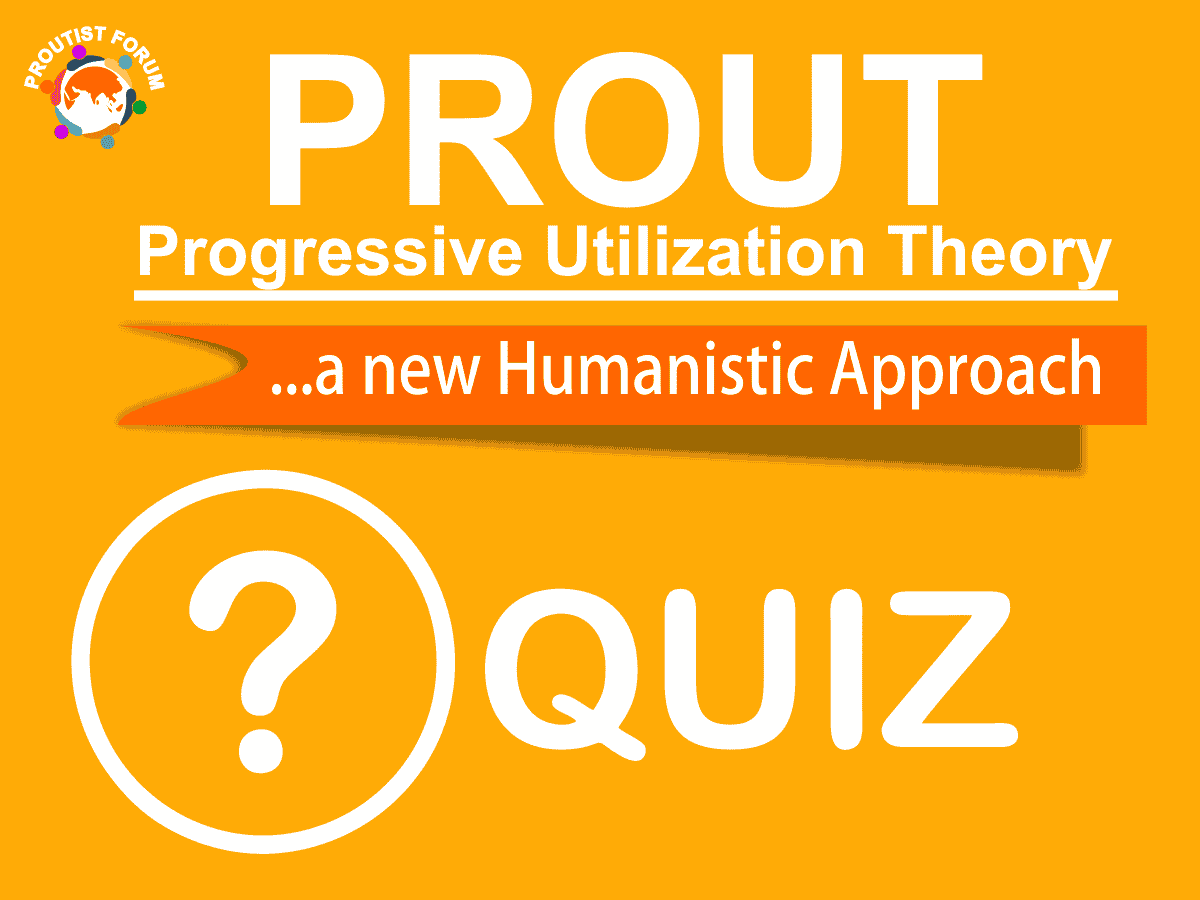PROUT (Progressive Utilization Theory) is an insightful concept developed by the revered thinker Sri Prabhat Ranjan Sarkar. It holds the promise of providing a balanced and holistic socio-economic framework.
Below is a quiz based on the PROUT theory to help you understand its key principles and functioning:
PROUT Theory – Quiz (Multiple Choice Questions)
1. Who is the founder of PROUT?
A. Karl Marx
B. Mahatma Gandhi
C. P.R. Sarkar
D. Swami Vivekananda
✅ Answer: C. P.R. Sarkar
2. In which year was PROUT first propounded?
A. 1947
B. 1955
C. 1959
D. 1962
✅ Answer: C. 1959
3. What is the full form of PROUT?
A. Provisional Utilization Theory
B. Practical Utilization Theory
C. Progressive Utilization Theory
D. People’s Rational Utilization Theory
✅ Answer: C. Progressive Utilization Theory
4. What is the primary goal of PROUT?
A. Maximum profit
B. Spiritual liberation only
C. Balanced development of all
D. Centralized government control
✅ Answer: C. Balanced development of all
5. PROUT supports which type of economy?
A. Capitalist
B. Socialist
C. Decentralized
D. Globalized
✅ Answer: C. Decentralized
6. Which of the following is a key feature of PROUT?
A. Free market competition
B. Class struggle
C. Cooperative ownership
D. Monopolistic control
✅ Answer: C. Cooperative ownership
7. How many fundamental principles does PROUT have?
A. 3
B. 5
C. 7
D. 10
✅ Answer: B. 5
8. What does PROUT say about minimum necessities?
A. They should be earned
B. They should be a fundamental right
C. They should be provided only to the poor
D. Government should not interfere
✅ Answer: B. They should be a fundamental right
9. According to PROUT, wealth should be:
A. Concentrated in private hands
B. Distributed by the state
C. Accumulated for national security
D. Rationally distributed
✅ Answer: D. Rationally distributed
10. What kind of development does PROUT advocate?
A. Urban-centric
B. Spiritual only
C. Balanced – physical, mental, spiritual
D. Technological only
✅ Answer: C. Balanced – physical, mental, spiritual
11. Which of the following is not aligned with PROUT?
A. Economic democracy
B. Exploitation
C. Decentralized planning
D. Spiritual values
✅ Answer: B. Exploitation
12. Which sector should manage the means of production, as per PROUT?
A. Private corporations
B. Central government
C. Local cooperatives
D. Military
✅ Answer: C. Local cooperatives
13. PROUT emphasizes that progress should be:
A. Technological only
B. Based on GDP
C. Progressive and spiritual
D. Controlled by elites
✅ Answer: C. Progressive and spiritual
14. What is “economic democracy” in PROUT?
A. Rule by capitalists
B. Public participation in economy
C. Political elections
D. Government-run markets
✅ Answer: B. Public participation in economy
15. In PROUT, the guiding force behind socio-economic policies must be:
A. Military strength
B. Political party ideology
C. Spiritual and moral values
D. Foreign policy
✅ Answer: C. Spiritual and moral values
16. What does PROUT say about population growth?
A. It's always bad
B. It must be forcefully controlled
C. It should be managed through education and consciousness
D. Not a concern
✅ Answer: C. It should be managed through education and consciousness
17. Which of the following does PROUT oppose?
A. Economic democracy
B. Spiritual growth
C. Monopolies and exploitation
D. Local planning
✅ Answer: C. Monopolies and exploitation
18. Which term does PROUT use for socio-economic units based on local self-reliance?
A. Zones
B. Global regions
C. Samajas
D. Panchayats
✅ Answer: C. Samajas
19. What is the PROUT view on unemployment?
A. It is natural in economic cycles
B. It should be solved through forced labour
C. Full employment is achievable
D. The unemployed should depend on charity
✅ Answer: C. Full employment is achievable
20. PROUT’s approach to ecology is:
A. Exploitative
B. Neutral
C. Harmony with nature
D. Development at all cost
✅ Answer: C. Harmony with nature
